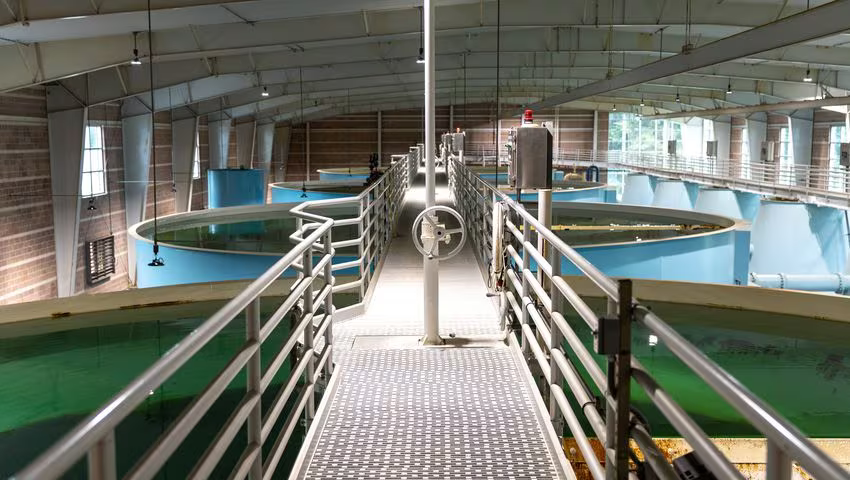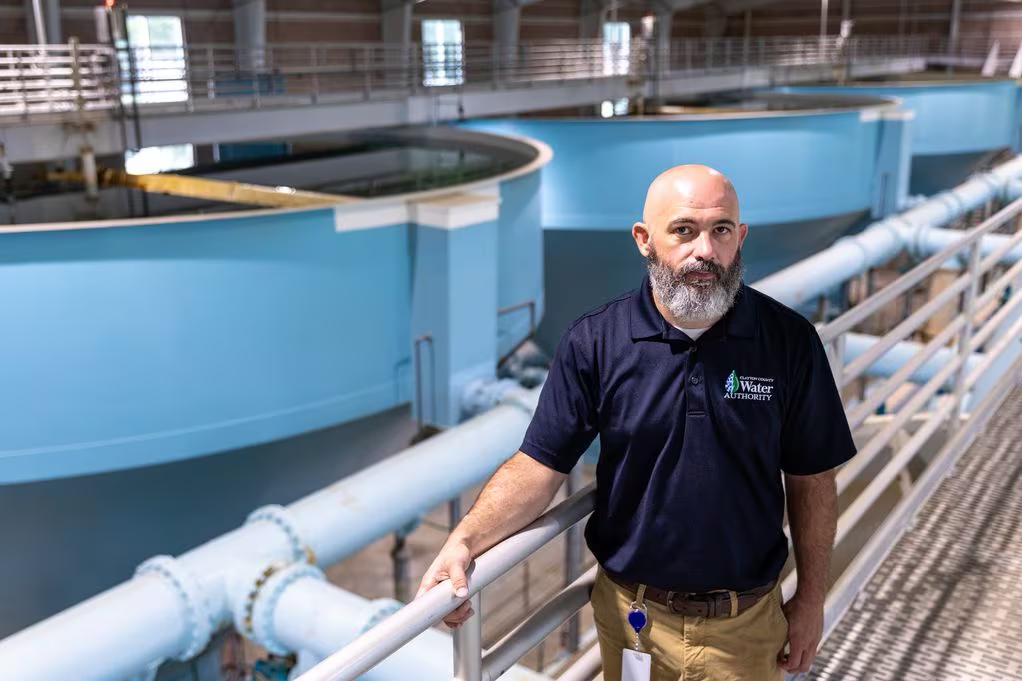GET A FREE QUOTE TODAY - CALL US 770-652-0076
Upgrading water treatment plants to filter out the industrial chemicals will cost billions

A mouse study inspired the new research
A new round of testing has revealed toxic chemicals linked to cancer and impaired immunity, including in children, in the drinking water of nearly a dozen systems across Georgia, according to the U.S. Environmental Protection Agency.
Clayton County, Austell and Covington are among 11 water systems out of 52 tested so far that reported contamination by so-called “forever chemicals,” also known as PFAS, the acronym for per- and polyfluoroalkyl substances. Widespread PFAS contamination of drinking water systems has been found in recent years around the United States — including in Georgia — since EPA issued health advisories based on new studies showing the chemicals are more toxic at lower levels than scientists previously thought.
The cost of upgrading water systems to remove PFAS from drinking water around the U.S. is astronomical, expected to far surpass the more than $9 billion in federal funding from bipartisan infrastructure legislation to address the issue. In Clayton County alone, officials estimate it will cost $450 million.
The source or sources of PFAS in Clayton County’s water are still being investigated. A county with significant industry, Clayton is also home to Hartsfield-Jackson International Airport on its northern edge and Fort Gillem, a former U.S. Army logistics post. The airport sits over the headwaters of the Flint River, one of Clayton’s water sources. PFAS, meanwhile, have been detected in the groundwater and surface water of Gillem, though a Clayton utility official said that facility is in a different watershed than the one from which the county draws its water.
More testing is needed to pinpoint where contaminants in Clayton’s water are coming from, but in other parts of the country, PFAS pollution has been traced back to manufacturing plants, leaking landfills and airports and military sites that use special PFAS-laden fire-fighting foam.
“There should be no PFAS in drinking water, so any level indicates industrial contamination of drinking water,” Jamie DeWitt, an associate professor of pharmacology and toxicology at East Carolina University, wrote in an email. “It does matter where PFAS are coming from so that they can be remediated and/or contained.”
In addition to unprecedented federal funding for PFAS mitigation, dozens of manufacturers that create or use PFAS have already agreed to pay billions to settle class-action lawsuits. But the cost of the upgrades needed to bring many water systems into compliance with the new federal standards is expected to far exceed the available funding. That means the cost could fall to water customers in the form of higher rates.
Advocates say the industries that created PFAS chemicals and released them into the environment should pay the cleanup costs — not taxpayers and water utility customers.
“That cost should be borne by the companies that manufactured, used and profited off this chemistry,” said David Andrews, a senior scientist with the Environmental Working Group, an advocacy organization that encourages regulation of PFAS.
The Georgia tests were conducted this year by water systems and reported to EPA as part of the agency’s periodic screening for unregulated contaminants in drinking water. A total of 262 Georgia systems — which serve more than 9 million people — are required to report their results by 2025.
EPA published the first batch of test results last month. While the agency has issued health guidelines for some PFAS — and a few states have their own regulations — there are no legally enforceable federal limits for the chemicals in drinking water. Despite decades of contamination, the agency is only now preparing to issue drinking-water limits on some types of PFAS, possibly by the end of this year.
The proposed limits are based on a growing body of evidence linking man-made PFAS to a broad array of serious health impacts such as fertility problems, developmental delays and decreased vaccine response in children, and increased risk of prostate, kidney and testicular cancer.
PFAS found
PFAS have been found in the blood of more than 90% of Americans exposed through environmental contamination as well as countless consumer products, from textiles and cookware to dental floss. The chemicals, generally added for their ability to repel grease and water, are often found in products designed to be stain-resistant or nonstick. They are called “forever chemicals” because they break down slowly, if at all, and accumulate in the body over time.
In Georgia, PFAS chemicals have already been identified in a number of public water systems, including Rome, where the city plans to build a new $100 million water treatment plant with lawsuit settlement money from chemical companies and flooring manufacturers.
The Georgia Environmental Protection Division (EPD) is doing its own testing, which shows PFAS in the systems of Columbus and Augusta-Richmond County, as well as towns in northeast Georgia.
The Department of Defense has also found PFAS in groundwater and/or drinking water at hundreds of active and closed military sites across the world. In Georgia, the department is investigating 19 locations, according to a spokesperson. Of these 19 locations, 15 are slated for remedial investigation, including Gillem.
This most recent round of test results submitted to the EPA is notable because it is part of the federal regulatory process. Every five years, the agency issues a list of up to 30 unregulated contaminants to be monitored by public water systems. This is usually a first step toward approving legally enforceable limits.
In this round, 29 of the listed contaminants are PFAS variants. EPA is so far proposing limits on just six. Thousands of PFAS compounds have been manufactured, and experts say all the variants studied to date are toxic.
The city of Atlanta’s water contained no reported contaminants.

Photo credit: Map: Stephanie Lamm Source:
Environmental Protection Agency, UCMR 5 Occurrence Data - Amounts represent the highest test result from any facility in the water authority published by EPA in August 2023, measured in parts per trillion.
People in the original blue zones drink lots of water
Along with Clayton County, Austell and Covington, the water systems reporting PFAS contamination include Blairsville, Cumming, Bremen, LaGrange, Port Wentworth, Henry County, Harris County and South Monroe County. Most of those systems did not immediately respond to requests for comment.
Blairsville Mayor Jim Conley said he didn’t know much about PFAS or what action the little city, which produces its own water, should be taking.
“If we knew where we was going with this and what it was going to take … we would get started now,” he said. “It’s a waiting game right now until EPA sets the rules.”
The EPD declined to make any officials available to discuss the test results. In a statement, an agency spokesperson said the state will work with the federal government and public water systems to implement finalized regulations.
Steep costs
The Clayton County Water Authority delivers water to more than a quarter million homes and businesses south of Atlanta. Its wastewater recycling program, which uses a network of constructed wetlands, reservoirs and water treatment plants, has earned recognition from conservationists and industry professionals.
Now, Clayton is facing an estimated $450 million in upgrades to filter out PFAS. Some of that includes the cost of a new plant the authority was already planning to build to replace an older facility.

The water authority found eight different PFAS chemicals in its drinking water, four of which are up for imminent regulation. The samples had readings as high as 8.5 ppt for PFOS and 5.5 ppt for PFOA, which puts them both over the proposed 4 ppt limit.
Clayton recently received a $16 million loan from the Georgia Environmental Finance Authority, which is dispersing federal funds for PFAS remediation for the design of the new system.
Even with billions in new federal funding and a Biden administration promise to prioritize addressing legacy pollution in majority Black communities like Clayton, the task, and the price tag, are daunting for officials like H. Bernard Franks, chief executive officer of the water authority. But Franks said the health and safety of the community come first.
“There’s a lot of us that are not only employees of the water authority, but we’re also customers — we drink the water,” he said.
Franks said there are multiple possible sources of PFAS chemicals in the county’s water that would explain its relatively high levels, compared to other metro Atlanta water systems.
“We’re still in the midst of trying to narrow that down and investigating that piece,” he said.
In addition to recycling wastewater, Clayton County also draws some of its water from the Flint River, whose headwaters are located beneath the Atlanta airport.
An airport spokesperson did not answer a question about whether officials there have carried out any groundwater or other environmental PFAS testing. The spokesperson issued a written statement saying the airport follows all local, state and federal regulations.
Separately, the Army found PFAS chemicals in the groundwater at the former Fort Gillem in Forest Park, which was divided, with a large portion sold to the city for redevelopment in 2012. A spokesperson said the Army is still responsible for cleanup on the entire site and is in the process of investigating the source and spread of the contamination.
Tests of drinking water at the post, which buys water from the Clayton County Water Authority, showed PFAS levels similar to those published by the EPA and the state.











